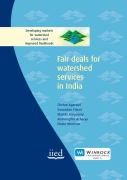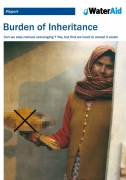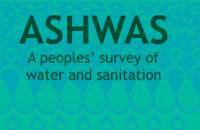Informal Sector
Developing markets for watershed services and improved livelihoods: Fair deals for watershed services in India - An IIED research paper
Posted on 07 May, 2010 10:51 PM The report presents field experiences and lessons in developing Incentive-based Mechanisms (IBMs) for watershed protection services and improved livelihoods at micro and macro-scales, derived from an action-learning project in India at three locations in the states of Himachal Pradesh (HP) and Madhya Pradesh (MP).
The report presents field experiences and lessons in developing Incentive-based Mechanisms (IBMs) for watershed protection services and improved livelihoods at micro and macro-scales, derived from an action-learning project in India at three locations in the states of Himachal Pradesh (HP) and Madhya Pradesh (MP).
An inter-village transaction was facilitated at one site (the Kuhan micro-catchment in HP), while at the second site (Suan micro-catchment in HP) a transaction failed to materialize despite initial interest. At the third site in MP, there was interest in undertaking a transaction between the city of Bhopal and the catchment of its lake, the Bhoj Wetlands.
The action research has yielded insights into the role of hydrological information, types of incentive mechanisms, the importance of institutions and the implementation of IBMs.
Burden of Inheritance: Can we stop manual scavenging? – A report by WaterAid India
Posted on 19 Apr, 2010 04:28 PM This report by WaterAid outlines how over one million people in the country continue to scrape an existence through manual scavenging, forced largely by social convention and caste prejudice, and calls for strong action to eradicate this practice.
This report by WaterAid outlines how over one million people in the country continue to scrape an existence through manual scavenging, forced largely by social convention and caste prejudice, and calls for strong action to eradicate this practice.
A violation of human rights, this discriminatory and demeaning practice was outlawed by the Indian Parliament in 1993 but still continues today. India has missed three deadlines to make the country 'manual-scavenger free'. India's booming cities help keep the practice alive, as there is often little infrastructure for sanitary sewerage and waste disposal systems.
The report tries to seek answers to why this practice continues despite:
- Availability of other dignified livelihood sources, for the people in this occupation?
- Other cleaner options for survival existing in cities and towns?
- Feasible and viable technological alternatives being available to dry toilets, one of the drivers of this occupation?
Implementation of National Rural Employment Guarantee Scheme in West Bengal: A field report by the Right to Food Campaign
Posted on 13 Apr, 2010 12:48 PMThis report from the Right to Food Campaign traces the implementation of National Rural Employment Guarantee Scheme (NREGS) in West Bengal and points to the failure of the State in guaranteeing basic entitlements. It asserts that West Bengal is way behind other States, in implementation of this scheme, as per the data on NREGS website.
NREGA news updates collated by the Foundation for Ecological Security (16-31 Oct 2010)
Posted on 21 Mar, 2010 03:45 AMArticle and Image Courtesy: Foundation for Ecological Security (FES)
Case studies - Drinking Water - Samagra Jal Vikash Samiti, Arghyam and Development Alternatives - Bundelkhand region of Uttar Pradesh and Madhya Pradesh
Posted on 28 Jan, 2010 06:17 PMThis document contains case studies from the work of Samagra Jal Vikash Samiti, Arghyam and Development Alternatives, in Rajpura, Kachipura, Pipra and Hastinapur villages of Bundelkhand region of Uttar Pradesh and Madhya Pradesh, in organising drinking water and improving water quality of available drinking water.
ASHWAS - A people's survey of water and sanitation in Karnataka (2009)
Posted on 05 Nov, 2009 04:17 PM
This report includes the findings of the ASHWAS survey (A Survey of Household Water and Sanitation), a participatory survey carried out by Arghyam, that included 28 districts of Karnataka covering more than 17,200 households across 172 gram panchayats (GPs). This was a peoples' survey, and the surveyors were selected from the respective communities that included students, women from self help groups, local NGO partners and other volunteers.
Shodh Yatra in Orissa and UP : Lessons in understanding the communities in different geographies and environment
Posted on 04 Nov, 2009 06:20 AM
“Few people know how to take a walk. The qualifications are endurance, plain clothes, old shoes, an eye for nature, good humor, vast curiosity, good speech, good silence and nothing too much.”
What kind of a walk must have Ralph Waldo Emerson had, to pen down these lines?
IUWM and participatory development:Community participation has a significant impact on the sustainability of the 3E's
Posted on 01 Nov, 2009 02:23 PMDepending upon how you see it, in the geographical expanse of India a train journey could be anything that one would wish it to be ...
State of the environment report - Tikamgarh district - Madhya Pradesh (2009)
Posted on 03 Oct, 2009 10:25 PMThis report on the state of the environment in Tikamgarh district, prepared by Development Alternatives, provides a summary of the environmental attributes and condition of the district and the human impacts on the environment. It also provides a public record of district authority, industry and community activities and achievements in responding to pressures on the environment. The purpose of this report is to bring out an overview of the environmental scenario of the district to serve as a baseline document and assist in logical and information based decision making.




